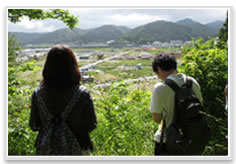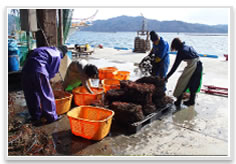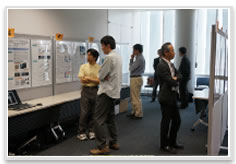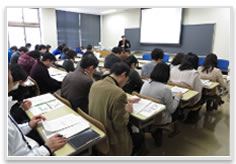- Implementation of the midterm plan and promotion of reconstruction efforts in Iwate
- Major Project Achievements for Academic Year 2014
The 2014 academic year was the third year of the second phase midterm plan.
In addition to the steady advancement of the midterm plan, we developed a 2014 academic year plan that also incorporated the recovery-support efforts.
For the recovery of Iwate prefecture, we have promoted planning focused on a 6-Priorities-Plan.
The entire university has been united in carrying out activities in support of reconstruction in order to respond to expectations of our students and the community as a university that contributes to both core human resources development and the generation of vitality in the region.
① Acquisition of new students that have a strong sense of purpose and passion for learning
■ Effective enhancement of high school and university collaboration projects
We organized various events to secure the number of applicants, such as the Open Campus, Campus Experience and the consultation for students who wish to enter our university.
Moreover, we established the “Iwate Prefectural University Committee of High School and University Collaboration” in order to solve challenges related to entrance examinations together with high schools, and examined specific solutions.
■ Establishing the Exemption System of Graduate School Entrance
Fee and measures to fill the enrollment capacity
The Exemption System of Graduate School Entrance Fee was established to reduce the economic burden on IPU students who wish to continue their study at one of our graduate schools.
At the same time we took measures to fill the student quota, for instance each graduate school held an information session for relevant people and parents.
■ Financial aid for students affected by the disaster
For students who were affected by the Great East Japan Earthquake and Tsunami, we continued to offer the reduction and exemption of tuition (37 students in total) and enrollment fee (44 students).
We also provided student loans from “Disaster affected students special quota” of the academic incentive, and 8 students plus 2 graduate students received the incentive.
② Execution of a systematic and consistent education program
■ Advancing the reformation of Basic Education
Reformation of English and Information Processing subjects were made at the Center for the Advancement of Higher Education and it was reflected in the curriculum alternation starting in the 2015 academic year.
We also set up the “Advancement of Higher Education Task Force” and initiated the investigation of various matters so that the reformation of Basic Education will be propelled.
■ Promotion of region-focused Education
We formulated the “Iwate Prefectural University International Exchange Policy” which defines the basic course of action regarding our international exchange.
In terms of sending students overseas, in addition to Korea and China, we have newly set up an education program related to international training in Boston, U.S. and also interacted with organizations of International Exchange Agreement.
We made preparation in association with the prefecture for the arrangement of accommodation facilities (guest houses) where researchers and students from overseas can stay.
■ Evaluation and adjustment of the new curriculum
Notification of the new curriculum for students was thoroughly made at each faculty.
Furthermore, we evaluated and made adjustments to the consistency between the new curriculum, the policy of degree conferment (Diploma policy) and the policy of curriculum arrangement and execution (Curriculum policy).
③ Supporting the development of student employability and promotion of employment within the prefecture
■ Strengthening the measures for public service examination
In order to strengthen the measures for civil service examination, we started a newly updated course for them (for instance, the number of lectures and mock examinations were increased).
■ Supports for students' volunteer activities
Following the “Support project for students' volunteer activities assisting disaster affected areas”, we have supported activities of 8 groups including “Iwate GINGA-NET”.
As a result, measures have been taken to support learning, tourism promotion and creating children's playground etc.
 Regional Revitalization Learning Program, Miyako course
Regional Revitalization Learning Program, Miyako course
 Support activity for fishery at Haru Ginga, one of the “Iwate GINGA-NET” projects.
Support activity for fishery at Haru Ginga, one of the “Iwate GINGA-NET” projects.
■ Smooth implementation of IPU-E map
Both at the Faculty of Policy Studies and Morioka Junior College, the self assessment system of employability utilizing IPU-E map (self assessment form of students' employability) is carried out on a regular basis for the purpose of accumulating data.
■ Enrichment of Career Development subjects
Encouraging students to foster the recognition of work, through Career Planning Seminars (people and occupations) and Career Development subjects at each faculty, we invited visiting lecturers and provided the opportunity for students to interact with various companies.
Internship programs are also organized within regular subjects at Faculty of Software and Information Science as well as Faculty of Policy Studies.
④ Carrying out research that is valuable to the region and publicly disclosing the results
■ Promotion of research into local challenges
We held the “Presentation of Iwate Prefectural University Research Achievements” on September 19th and 20th and our various research achievements were presented to the people of Iwate.
[i-MOS section]Lectures: 12 titles, Panel Presentation: 24 titles
[Center for Regional Policy Studies section]Lectures: 16 titles, Panel Presentation: 39 titles
[Students of Department]Lectures: 11 titles, Panel Presentation: 12 titles
■ Carrying out research that is valuable to the region and publicly disclosing the results
Through regional joint researches at the Center for Regional Policy Studies and projects of faculties, researches to solve local challenges including disaster recovery were advanced further.
At the same time, the “Study group that considers disaster recovery through tourism of Iwate”, composed of our faculty members who conduct tourism related researches, researched the information distribution system which can be used for sightseeing guidance as well as disaster management learning and aimed to establish it into practical application.
■ Encouraging more applicants for the Scientific Research Grant
The “Brush Up Grant” was newly established to encourage more applications
for the Scientific Research Grant and the aid was offered to cover the cost for receiving advice and guidance from external researchers regarding the brush up of research plans.
Among 5 cases which IPU adopted for the Brash Up Grant, 4 cases applied for the Scientific Research Grant.
⑤ Strengthening the Collaboration between Industry, Academia and Government, and demonstrating the Think-tank Function.
■ Establishment of the cross-faculty “Progressive Reconstruction and Recovery Project”
Setting the goal of contributing to the disaster recovery, we launched the “Progressive Reconstruction and Recovery Project from the Great East Japan Earthquake and Tsunami” at the Center for Regional Policy Studies and initiated the following researches.
A) Preventing people from isolation by utilizing ICT and creating life supportive community in Kamaishi area.
B) Enhancing the competitive Processing and Trading Industry of Marine Products in coastal areas of Iwate
prefecture and expanding employment.
■ Engineer training and product development at i-MOS
We engaged in research activities through the project of “IWATE Innovation Area for Next Generation Mobility” and manufactured trial machines for commercialization. In terms of the highly skilled engineer training course, there were 12 courses provided and also 4 training sessions were held to nurture young engineers for 3D shaping techniques.
■ Strengthening the cooperation with Takizawa City IPU Innovation Center
Takizawa - IPU secondary innovation center opened in May 2014 and there are 18 companies occupied at the First and Second Innovation Centers as of March 31st 2015.
With the support of the Industry and Academia collaboration coordinator helping us match joint researches between our faculty members and companies, and also by providing access for those companies to some of our lectures at the Faculty of Software Information Science, we enhanced the cooperation work with companies occupied at Takizawa City IPU Innovation Centers.
⑥ Development of teaching staff who contribute to the realization of the ideals of university
■ Introduction to the Sabbatical Training System
The sabbatical system was introduced to allow faculty members to take some time off from work and focus on their own education and research for a certain period so that they can improve their education learning and research ability.
1 member received the benefit originally and it's been decided that there were 2 members to receive it in 2015 academic year.
■ Support for the career development of faculty members with the vision and plan of human resource development
For those members who are not available to participate in a training trip due to family circumstances, we offered a new E-learning system of training.
Moreover, we established a system to send faculty members to the office of the Association of Public Universities for training as a new attempt to support the career development of the members.
■ New program that combines FD and SD
“The All-Campus FD/SD seminar”, a combination of FD (Faculty Development) and SD (Staff Development), was held twice.
While understanding the trends of Education Reform, we shared the ideas of curriculum construction through the reports from each faculty.
 “Presentation of IPU Research Achievements” was held in September.
“Presentation of IPU Research Achievements” was held in September.
 The Second All-Campus FD/SD Seminar
The Second All-Campus FD/SD Seminar




